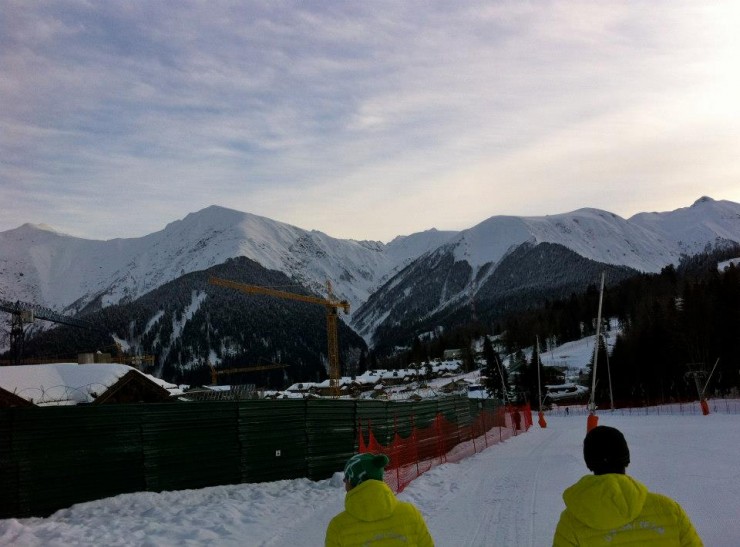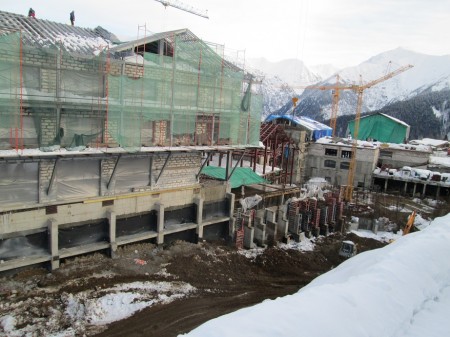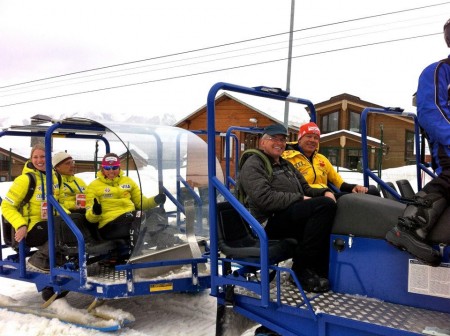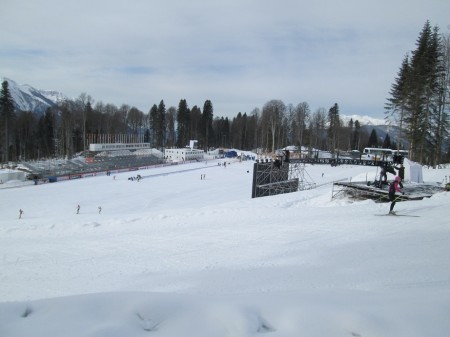
After a short break in the calendar, World Cup action begins again on Friday in Sochi, Russia, with a triple-header: a freestyle sprint, a 15/30 k skiathlon and a classic team sprint. More than the usual amount of intrigue surrounds the upcoming events; in addition to being the first World Cup in almost two weeks, this will be the first international cross-country event to take place at the Olympic venue for the 2014 Games.
The cross-country stadium sits a few kilometers to the northeast of a town called Krasnaya Polyana on the slopes of Psekhako Ridge, a mountain range that rises several thousand feet above the nearby Black Sea. For race organizers, the World Cups will serve as a test run for the venue, which is still under construction in many places, while for national teams the races are an opportunity to preview the courses that will be used for the big event next February.
Given Sochi’s remote location and the fast-approaching World Championships, many national teams will skip this weekend’s World Cup entirely. Athletes from U.S. and Canada, however, are taking the opportunity to preview the Sochi courses. The U.S. Ski Team has been on site since Sunday, and Liz Stephen, for one, is impressed with the venue so far.

“It’s really cool to be at the venue so far,” she wrote in an email. “Lots of construction happening, and the trails are coming together too. [I’m] psyched to see what it will be like for the weekend and racing.”
The Canadian National Ski Team is also in Sochi this week. They are staying in Krasnaya Polyana further down the mountain, and to get to and from training every day the athletes take a 20-minute ride in a gondola from the base of the hill, where an extended snowmobile shuttles them to the trails five minutes away.
Ivan Babikov is a native Russian, and one of the most familiar with the area out (along with teammate Dasha Gaiazova, also born in Russia). After a few days of training and living at the venue Babikov was most struck by the change and building development since he was last there several years ago.
“You won’t believe how much construction [is] still going on all over the place,” he said. “Construction of the century… Last time I raced here like six years ago, all of this wasn’t existing. There was nothing here. From the words of other Russians, there was nothing two years ago. Right now I’m looking out the window and there’s a mountain river and it doesn’t look like Russia. It looks like a boardwalk. It looks like a mountain town.”

While there is still more to be done before next winter, Babikov said it appeared as though the organizers were on top of it. The routine athletes must go through with the snowmobile shuttles is only temporary, for example, and there will be a handful of more gondolas a year from now.
“[I’m] just excited to be back in the motherland, and it’s changed so much,” Babikov said. “It feels like Europe…it’s so nice. At the same time, it’s, like, pimp. Everyone is really surprised what they see here, and they’re like, ‘Wow.’ This place next year is going to look even different.”
Relative to central European World Cup venues, athletes say some aspects of the Sochi experience have been jarring.
“There is way less freedom here than I’m used to having on the World Cup,” said the USST’s Noah Hoffman. “At every other venue I’ve ever been to, I can go for a run whenever and wherever I want. Here in Sochi, we’re stuck on top of a mountain, there are armed guards everywhere, and if you forget your credentials when you leave the athletes’ village you won’t be coming back.”

As for the trail system itself, Babikov and Hoffman both expect the sprint course in particular to be a challenge. At 1.8 k it’s longer than most World Cup sprints, and it has an extra-tricky final climb.
“All the guys — they’re not freaking out, but they’re shocked,” Babikov said. “It’s 1.8, I think, and really long. Super hard, like a four-minute loop. Like so hard, the last uphill is insane.”
Babikov thought Saturday’s skiathlon course would be difficult, too.
“First lap I feel like it would be too easy, except that last climb that’s long,” he said. “[The] skate part is redonkulous. It starts in the stadium and just blows downhill [at] like 80 kilometer an hour, fast. [We] do a couple loops on the bottom there and you just climb six minutes back up … and you do it three times.”
After three back-to-back races this weekend, athletes will have a pretty good idea of how the Sochi courses run. And with just a year to go before the Games — the women’s skiathlon kicks off the cross-country events on February 8, 2014 — every morsel of information that can be gathered will help athletes towards Olympic goals.
Hoffman put it this way: “If we qualify for the team, we will have the opportunity to achieve our lifelong dreams and possibly change cross country skiing in the U.S. at this venue. This weekend I am looking to have a good World Cup result but also to learn about these courses. When I leave here Monday, I hope to have an idea of what it will take to win an Olympic medal on these courses next year and what aspects of my skiing need the most improvement in order to make that a realistic possibility.”
The freestyle sprint qualifier kicks things off in Sochi on Friday at 12:30 pm local time, and quarterfinals begin at 2:30 pm.
— Alex Matthews contributed reporting.
Audrey Mangan
Audrey Mangan (@audreymangan) is an Associate Editor at FasterSkier and lives in Colorado. She learned to love skiing at home in Western New York.



